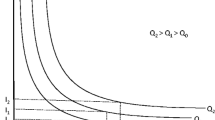Abstract
A contest for world leadership in science and technology exists. New ways to motivate scientists seem as important to contest outcome as new sources of funds. A framework formed by cross-tabulating question difficulty and answer generality should help to identify the contribution of a research scientist. A reward relationship based on this framework should help to ensure that scientists will work on the most difficult research problems, a necessity for a high quality research program.
Similar content being viewed by others
References and Notes
United States Statutes at Large, 1978. Volume 92, Public Law 95–454, Statute 1111.
Even the widely known studies ofPelz andAndrews assessed a scientist's productivity by counting the number of publications, patents or patent applications, and unpublished reports in a five year period. Neither question difficulty nor answer generality played a role in their assessment procedure. D. PELZ F. ANDREWS,Scientists in Organizations, John Wiley, New York, 1966.
W. BROAD,Science 211 (4487) (1981) 1137–1139.
M. BUNGE,Scientific Research I: The Search for System, Springer-Verlag, New York, 1967.
P. FEYERABEND,Against Method-Outline of an Anarchistic Theory of Knowledge, NLB, London, 1975.
G. MROZ, private communication.
A. SZENT-GYÖRGYI,Bioenergetics, Academic Press, New York, 1957.
M. BUNGE,Scientific Research II: The Search for Truth Springer-Verlag, New York, 1967.
C. HEMPEL,Aspects of Scientific Explanation and Other Essays in the Philosophy of Science, Free Press, New York, 1965; E. KLEMKE, R. HOLLINGER, A. KLINE, Eds,Introductory Readings in the Philosophy of Science, Prometheus Books, Buffalo, 1980.
G. MYRDAL,Bulletin of the Atomic Scientists, 29 (1) (1973) 31–37; L. THOMAS,The Youngest Science: Notes of a Medicine Watcher, The Viking Press, New York, 1983.
J. HOSPERS,An Introduction to Philosophical Analysis, Prentice-Hall, Englewood Cliffs, 1967. I limit myself to answers as single statements. Thus, I do not include theories, which may consist of several law-like statements2. Generality of applicability or domain of truth is but one of several criteria that can be used to select from among several candidate law statements. Others that have been suggested are: formal simplicity, approximation to the truth, and theoretical tractability.
H. NAHIKIAN,A Modern Algebra for Biologists, The University of Chicago Press, Chicago, 1964.
E. NEY,Science 222 (4623): 456.
A. SZENT-GYÖRGYI,Perspectives in Biology and Medicine 15 (1) (1971) 1–5.Szent-Györgyi even argues that older scientists should tackle the more difficult problems, thereby leaving some of the less difficult to younger scientists in need of some successes at the start of their career.
I thank E.Bakuzis, R.McRoberts, E. H. T.Whitten, G.Brown, R.Lee, and R.Monserud for constructive review comments.
Author information
Authors and Affiliations
Rights and permissions
About this article
Cite this article
Leary, R.A. A framework for assessing and rewarding a scientist's research productivity. Scientometrics 7, 29–38 (1985). https://doi.org/10.1007/BF02020139
Received:
Issue Date:
DOI: https://doi.org/10.1007/BF02020139




